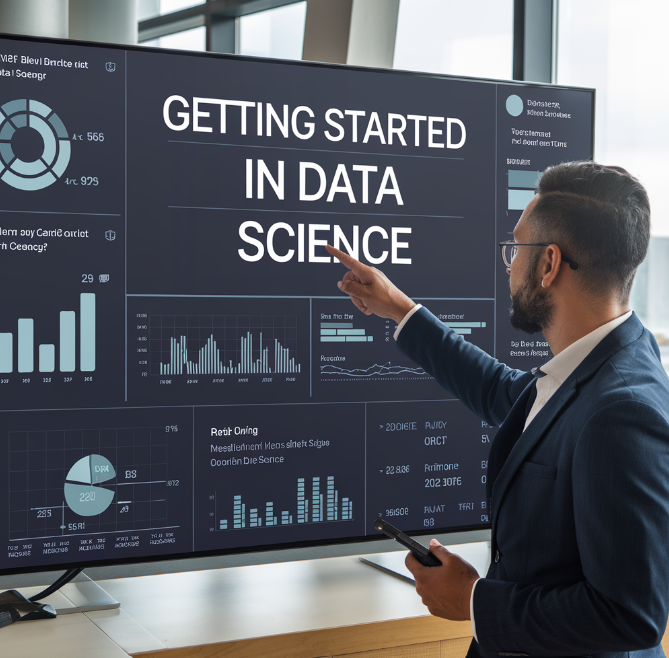One of the most fascinating and in-demand professions nowadays is data science. Commencing a career in data science can be gratifying and demanding, regardless of whether you’re a student, an experienced professional seeking a change in direction, or someone who is just interested in the potential of data. You can become a data scientist by following this tutorial, which will assist you in taking the initial steps in the correct direction.

Why Choose Data Science?
Data science is becoming an increasingly important expertise in a variety of areas, including technology, healthcare, finance, and marketing, as the need for data-driven decisions grows. Data scientists assist businesses in utilising data to better identify trends, forecast future results, and adjust their plans. In addition, there are many of creative and problem-solving opportunities in this profession.
Essential Skills for Data Science:
Before diving into tools and technologies, it’s essential to build a solid foundation of knowledge and skills that every data scientist needs.
- Mathematics and Statistics
Math, particularly statistics, is at the core of data science. To extract meaning from data, one must grasp statistical significance, hypothesis testing, probability, and distributions. Acquiring knowledge of calculus and linear algebra will be beneficial when working with machine learning algorithms.
- . Programming Skills
The two most popular programming languages in data science are Python and R. Python, in particular, offers a rich ecosystem of libraries (such as Pandas, NumPy, and Matplotlib) intended expressly for data analysis, manipulation, and visualization. Becoming proficient with SQL is also necessary for database management and querying.
- Data Manipulation and Cleaning
A data scientist’s time is primarily devoted to data preparation and cleaning. A crucial ability is understanding how to work with complicated datasets, including how to eliminate duplicates, handle missing information, and change data formats. This procedure is made easier by tools like dplyr (R) or pandas (Python).
- Data Visualization:
Data visualisation is essential for comprehending trends and conveying outcomes. You’ll need to learn how to use packages like ggplot2 (R) or Matplotlib and Seaborn (Python) to generate relevant charts and graphs. These images have the ability to express stories that numbers cannot.
- Machine Learning:
Data scientists can create models that forecast future events based on historical data by using machine learning. It’s critical to comprehend techniques such as neural networks, decision trees, clustering, and linear regression. Scikit-learn, a Python library, offers simple-to-use tools for putting machine learning models into practice.
- Domain Knowledge
Although technical proficiency is essential, it’s also critical to comprehend the particular field in which you operate. Whether you work in marketing, finance, or healthcare, being well-versed in your industry enables you to make insightful decisions and meaningfully evaluate data.
Tools and Platforms to Get You Started:
- Jupyter Notebooks:
Jupyter notebooks provide an interactive environment where you can create Python code, visualise data, and document your workflow all in one location, making them a great tool for beginners.
- Google Colab:
Jupyter Notebooks is also available on the cloud via Google Colab. It’s free, allowing you to write and execute Python code, and comes with pre-installed libraries. Anyone who wishes to avoid the trouble of setting up a local environment will find it to be quite beneficial.
- Kaggle:
In addition to serving as a venue for data science competitions, Kaggle offers a treasure trove of educational materials. Expert tutorials, notebooks, and datasets are available. Engaging in Kaggle competitions is an excellent method to hone your abilities and resolve practical data issues.
- Tableau and Power BI:
Tools like Tableau and Power BI make it simple to generate dashboards and visual representations of your data for individuals interested in business intelligence and data visualization.
Conclusion
Although starting a career in data science can seem daunting, the process is one of learning and development. With the appropriate approach, effort, and continual learning, you may establish a great career in this dynamic area. The skills you acquire in data science will be extremely important and in great demand in today’s data-driven world, regardless of your career goals—be they machine learning engineer, data scientist, or analyst.